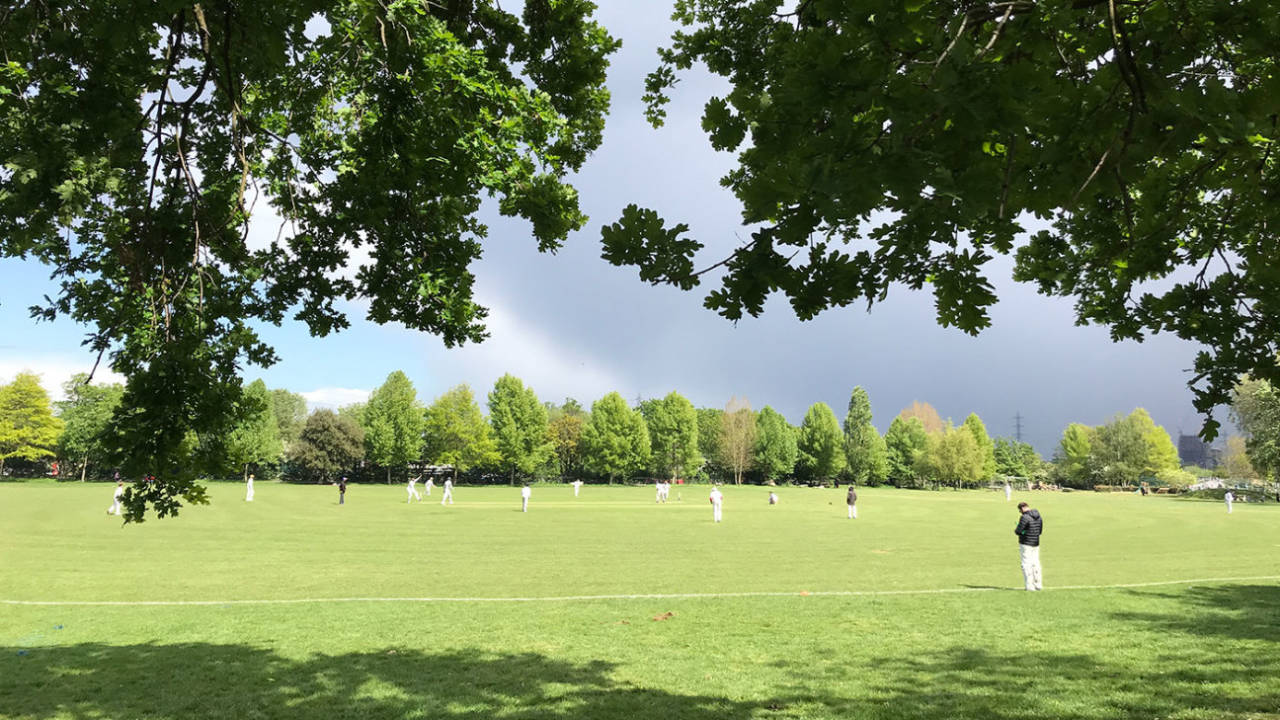ECB urged to make junior schemes more relevant to South Asian community
Study reveals potentially devastating loss of council-run cricket pitches in wake of Covid-19 outbreak
Andrew Miller
15-Jun-2020
A club cricket match takes place in Springfield Park, East London • Andrew Miller
The ECB has been challenged to do more to ensure its junior participation schemes are made relevant to the South Asian cricketing community, following a new study that has revealed a potentially devastating reduction in council-run cricket pitches in the wake of the Covid-19 outbreak.
Writing in the National Asian Cricket Council newsletter, chairman Gulfraz Riaz cited the findings of a recent report by the Grounds Management Association, which estimates that cricket - with its specialised requirements for pitch maintenance - could be the hardest-hit sport in the UK post-Covid, with more than half of its playing capacity lost in the coming decade, compared to a fifth for rugby and football.
And this, in turn, could put huge pressure on the Asian cricketing community, which is estimated to represent between 30 and 35% of all active cricketers in the UK, but - unlike the club structure of traditional English cricket - is based overwhelmingly on a complex network of parks leagues that the ECB, through its county boards, has so far struggled to support through the pandemic.
Writing in the newsletter, Riaz says that the Covid outbreak has had a "hugely detrimental and potentially even longer-lasting effect on the South Asian Parks Cricketing Community (SAPCC) up and down the country," and adds that, while the community remains self-sufficient for now, "the first small signs of cracks have started to appear" in the decades-old league structures, not least because young British Asians are as tempted as their white-British counterparts by alternative forms of recreation.
"The problems at hand are two-fold," Riaz wrote. "Firstly in terms of very real and meaningful engagement with the next generation of young Asian players and secondly the unfortunate case of still being left to play on substandard local authority grounds and facilities. These are incredibly alarming signs [but] something actually we should not be too surprised to see."
The ECB launched the South Asian Action Plan in May 2018 with the aim of engaging more effectively with South Asian communities at every level of the game. And while the board admitted from the outset that there was no "quick fix" to the status quo, it has since invested significantly in the sort of publicly-accessible facilities that the parks leagues rely on, including a new partnership in Manchester that will deliver 92 new all-weather pitches across every borough of the city.
However, recreational cricket in England and Wales remains suspended indefinitely due to the pandemic, which means that the ECB's hopes of building on the extraordinary success of last summer's World Cup and Ashes series have also taken a hit.
And while Riaz acknowledged that the ECB's All-Stars programme, aimed at 5 to 8-year-olds, and the new Dynamos scheme for 8 to 11-year-olds were "very welcome additions", he warned that their club-based points of delivery meant that the parks leagues had been "bypassed" on that front.
"It is absolutely imperative therefore that the drivers of these programmes listen, understand and find very real and meaningful ways to directly engage with the cricketing heads from these leagues," he wrote, "and most importantly get a grip in helping sustain and grow cricket within the SAPCC and youngsters from this important section of the national cricketing community."
The UK economy shrank by more than 20% in April due to the Covid lockdown, and speaking to ESPNcricinfo, Riaz acknowledged that local authorities could not be expected to prioritise council-run cricket pitches over and above other key public services, such as maintaining highway verges and cemeteries.
But, he added, the economic downturn was bound to have knock-on effects on Asian participation in particular when cricket does resume, and stressed that, two years on from the launch of the South Asian Action Plan, it was the duty of county boards to find a way to ensure that the ECB's offers of financial support during the pandemic were able to filter down to the parks communities.
"The driving force for the Asian cricket community are its leagues," said Riaz. "These are made up of teams drawn up from taxi ranks and restaurants. They are not constituted, they don't have bank accounts, they are set up in an individual's name, and that causes problems when funding needs to be transferred.
"Asian cricket has previously thrived on a pay-as-you-play structure," he added. "These teams don't have gas and electricity bills - they don't even have clubhouses - so in some ways they are immune to the economics. But if these same players are obliged to put food on the table rather than play cricket when their businesses do reopen, then we will be looking at a huge decline in numbers."
Responding to the points raised, a ECB spokesman told ESPNcricinfo that the board was committed to making all of its programmes welcoming and diverse as part of the South Asian Action Plan. Citing the initiative in Manchester, he added that 17 of those new pitches would be introduced in parks and playing fields in Greater Manchester this year, and that, nationally, 549 female South Asian volunteers had so far been recruited to help deliver the All Stars programme in key inner-city areas.
"We continue to talk regularly to our County Cricket Boards (CCBs) and our leagues and clubs across the country to understand the needs of those reliant on public facilities as the social restrictions begin to ease, to offer support and to match them with additional cricket facilities where appropriate," the spokesman added.
Andrew Miller is UK editor of ESPNcricinfo. He tweets at @miller_cricket
